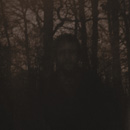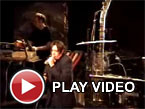3/4HadBeenEliminated, "A Year Of The Aural Gauge Operation"
 This supergroup among the new wave of Italian experimentersput out one of my favorite records of 2004 and returned in late 2005 withanother favorite. Members ValerioTricoli, Claudio Rocchetti, and Stefano Pilia represent some of the mostmystical, lyrical music I’ve heard come out of Italyor anywhere in some time. ¾, theircollaborative group, now with percussionist Tony Arrabito, make brilliantlyinviting and adaptable music mixing melancholy chamber acoustics, ambientimprovised textures, and woven electronic and mechanical effects.
This supergroup among the new wave of Italian experimentersput out one of my favorite records of 2004 and returned in late 2005 withanother favorite. Members ValerioTricoli, Claudio Rocchetti, and Stefano Pilia represent some of the mostmystical, lyrical music I’ve heard come out of Italyor anywhere in some time. ¾, theircollaborative group, now with percussionist Tony Arrabito, make brilliantlyinviting and adaptable music mixing melancholy chamber acoustics, ambientimprovised textures, and woven electronic and mechanical effects.
The sound is a lo-fi trio, languishing in a woody, goldenroom, half-asleep and wading through brushed textures and sad crescendos, whilethe fourth cuts into everything with slow slices of field noise, the occasionalglitch-pop or little breaking object. Inmy review of their first record, I talked about the way these interruptions,rather than leading outside, or becoming immediately contrastive presences,instead work at saturating or carving out an existing environment. Incidental sounds pop into existence asguidance for the more conventionally song-like structures or become buriedmarkers for shifts in the mood or momentum of a song, arriving with anarbitrary quickness that is never forced, always magical.
The general, droning quietude of the group’s self-titleddebut made the subtlety of their methods more effective than it is on Year, a record more reliant onpercussive, “pop” forms but also infinitely more lush in its assemblage ofsonic details. Vocals appear for the firsttime, and the musicians seem more confident in articulating even the smallest,potentially intrusive elements (including shrill alarm sounds and cannedscreams). All in all, the sound is lessveiled, less overcome by Pilia’s exquisite, Lid-ian guitar drones and morecomparable to ambience in the natural world: more irregularities and lopsidedrhythms, more chatter and clatter.
Recognizable field captures from ocean and woods direct themood more towards the pastoral than the monolithic, sublime abstractions of theband’s first disc, but Year’s mood isjust as hard to isolate and should appeal to many tastes, from post-rock, tojazz, even glossy, symphonic rock or the most austere of experimental orcontemporary classical. My most obviouscomparison is the recent work of Dean Roberts, with whom several of theseItalians have worked, and who likewise embraces the synthetic punctuation ofmelancholy acoustic sound in the creation of ornate, baroque masses of sound asopposed to ascetic dissolves. Though theout-of-improv feel of most of this disc tends to conjure ethereal imagery, eachmoment remains a monument to grandeur and presence,in sound, in life.
samples:



